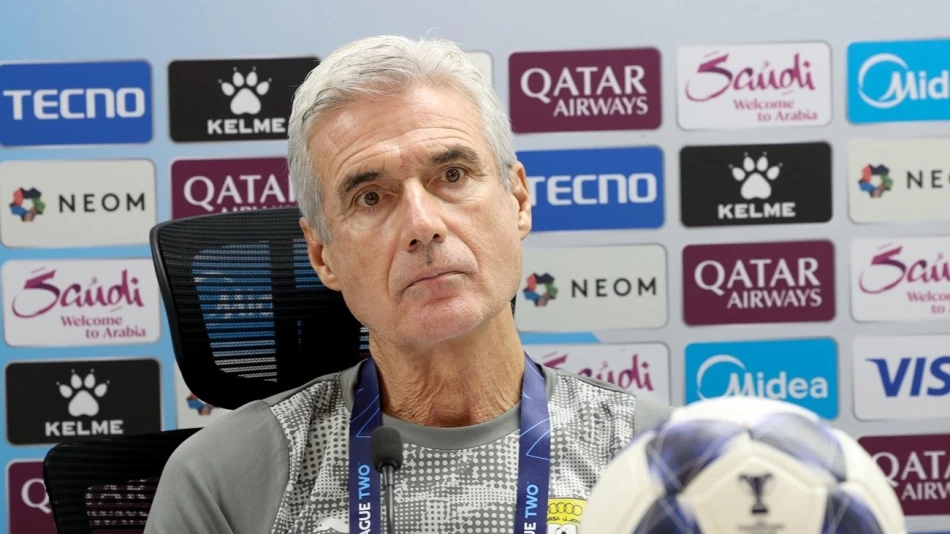
Wosool Coach Castro: Thrilling 7-0 Victory Over Istiklal Doesn't Mean the Match Was Easy
Al Wasl Delivers Historic 7-1 Rout Against Iranian Opposition in AFC Champions League
Al Wasl's commanding 7-1 victory over Iran's Esteghlal marks the largest margin of victory by an Emirati club against Iranian opposition in continental competition history. The result signals the UAE's growing football ambitions and sets a strong foundation for Al Wasl's AFC Champions League 2 campaign, demonstrating how tactical discipline and home advantage can overwhelm traditionally strong Iranian sides.
Castro's Tactical Masterclass Disguises Complex Victory
Portuguese coach Luis Castro was quick to temper expectations following his team's demolition of Esteghlal at Zabeel Stadium. Despite the emphatic scoreline, Castro insisted the match required serious preparation and execution, crediting his players' concentration rather than any weakness from the Iranian visitors.
"Winning by seven goals doesn't mean the match was easy. We worked with complete seriousness, and the strong performance from the players is the reason for this big result," Castro explained in his post-match press conference. His measured response reflects the experience of a coach who understands that early continental success means little without sustained performance.
A Statement Victory for Emirati Football
The result carries significance beyond three points in Group 1 of the West Asian zone. Iranian clubs have historically dominated Gulf opposition in continental competitions, making Al Wasl's performance a potential watershed moment for UAE football development. The victory suggests improved infrastructure, coaching standards, and player recruitment are beginning to pay dividends for Emirati clubs.
First Half Foundation
Al Wasl's tactical approach became clear from the opening minutes. Fabio Lima's stunning long-range strike in the 6th minute set the tone, followed by Nicolas Giménez's clinical finish after a Serginho assist in the 12th minute. The Brazilian midfielder Serginho emerged as the creative fulcrum, consistently finding space between Esteghlal's defensive lines.
Pedro Malero's 41st-minute goal, again created by Serginho's vision, effectively killed the contest before halftime. Esteghlal's solitary response through Rooheh Geshmi's strike provided brief hope but couldn't stem Al Wasl's momentum.
Second Half Showcase
The second period transformed into an exhibition of clinical finishing. Lima's penalty conversion, Renato Junior's brace, and Sofiane Boufal's header demonstrated the depth of quality throughout Castro's squad. Each goal showcased different tactical elements – set piece execution, penalty area movement, and aerial prowess.
Regional Implications and Market Dynamics
This victory positions Al Wasl as serious contenders for AFC Champions League 2 honors, a tournament that serves as a pathway to the premier AFC Champions League Elite. Success here would represent significant commercial value, with qualification bringing enhanced sponsorship opportunities and regional television exposure.
The performance also validates the UAE's strategic investment in football infrastructure and foreign coaching expertise. Similar to how Saudi Arabia's aggressive recruitment has elevated their domestic league profile, the UAE appears to be reaping benefits from sustained investment in technical development.
Looking Forward: Sustainable Success or False Dawn?
Castro's emphasis on competing across all competitions – domestic and continental – reveals ambitious planning. However, the true test lies in maintaining this standard against varied opposition styles throughout the group stage. Iranian clubs typically respond strongly to early setbacks, making future encounters potentially more challenging.
The victory provides Al Wasl with psychological advantage and goal difference cushion that could prove crucial in a competitive group. More importantly, it demonstrates that Emirati clubs can match and exceed traditional regional powers when properly prepared and motivated on home soil.
Most Viewed News

 Sara Khaled
Sara Khaled






